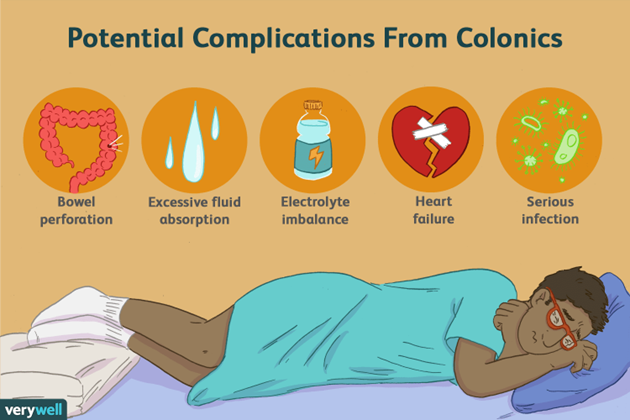A nurse is assessing a client who has a new diagnosis of diverticulitis and reports that he uses multiple complementary and alternative healing therapies.
Which of the following complementary therapies should the nurse identify as contraindicated for the client?
Acupuncture.
Saw palmetto.
Colonics.
Guided imagery.
The Correct Answer is C

Colonics, also known as colonic irrigation or colon hydrotherapy, involves flushing the colon with fluids to remove waste and is not recommended for individuals with diverticulitis.
Choice A is wrong because acupuncture is not a contraindication for a client with diverticulitis.
Choice B is wrong because saw palmetto is not a contraindication for a client with diverticulitis.
Choice D is wrong because guided imagery is not a contraindication for a client with diverticulitis.
Nursing Test Bank
Naxlex Comprehensive Predictor Exams
Related Questions
Correct Answer is C
Explanation
“I’m too tired to brush my teeth.” This statement indicates that the client is experiencing fatigue, which is a common symptom of heart failure.
Fatigue can significantly impact a person’s ability to perform daily activities and can be an indication that the client needs a referral for cardiac rehabilitation 1.
Choice A is not the correct answer because weighing oneself daily is a recommended self-monitoring technique for clients with heart failure.
Choice B is not the correct answer because while feeling unhappy can be a symptom of heart failure, it does not necessarily indicate a need for cardiac rehabilitation.
Choice D is not the correct answer because eating a low-sodium diet is a recommended dietary change for clients with heart failure.
Correct Answer is D
Explanation
Monitor the client for adequate urine output.
When administering potassium chloride via IV infusion to a client who has severe hypokalemia, it is important for the nurse to monitor the client’s urine output to ensure that their kidneys are functioning properly and that they are able to excrete excess potassium.
Choice A is incorrect because the infusion site should be checked more frequently than every 4 hours.
Choice B is incorrect because the maximum recommended rate of infusion for potassium chloride is 10 mEq/hr.
Choice C is incorrect because Chvostek’s sign is used to assess for hypocalcemia, not hypokalemia.
Whether you are a student looking to ace your exams or a practicing nurse seeking to enhance your expertise , our nursing education contents will empower you with the confidence and competence to make a difference in the lives of patients and become a respected leader in the healthcare field.
Visit Naxlex, invest in your future and unlock endless possibilities with our unparalleled nursing education contents today
Report Wrong Answer on the Current Question
Do you disagree with the answer? If yes, what is your expected answer? Explain.
Kindly be descriptive with the issue you are facing.
